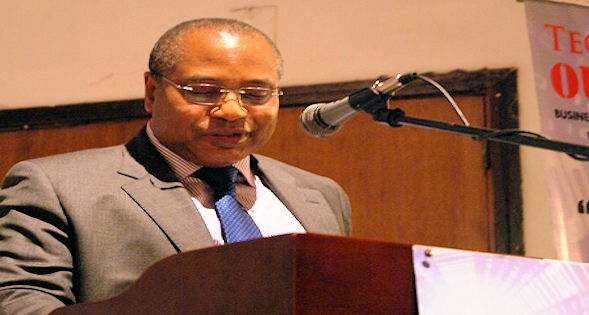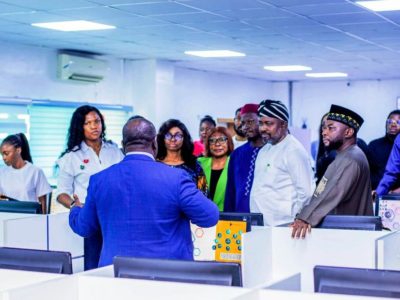By SEGUN ORUAME
Fixed line and broadband deployment; compliance, monitoring and enforcement of regulations form the plank of a five-point focus of Nigeria’s new telecom regulator Dr Eugene Juwah as he announced structural changes within the Nigeria Communication Commission (NCC) to effectively begin his administration of Africa’s largest telephone market of over 80 million active lines and more than 110 million connected lines.
The regulator warns that it would not tolerate shoddy services and says there would be penalty for poor service quality in accordance with the law.
The regulator, in an interaction with the media in Lagos, assured on sustaining this growth but said growth will be hinged on a new five-year regulatory focus directed at five key areas including: “consolidation and integration of mobile wireless services; fixed line and broadband deployment for national development; enhanced competitive market, enhanced choice for the consumer; vigorous compliance monitoring and enforcement of regulations and directions; national connectivity for accelerated growth; and enhanced international relations.”
Juwah said the commission will adopt a stricter approach to ensuring compliance to regulation in what would signify a potential shift from what critics have called ‘soft-pad’ regulation of his immediate predecessor.
His words: “In some cases, factors attributable to the harsh operating environment have put the regulator at the long end of wielding the big stick. It would therefore appear that the service providers have taken this soft approach towards enforcement and compliance to regulations for granted in the discharge of their responsibilities to the nation, the Commission and the consumers.”
While Nigeria’s huge mobile subscriptions of over 80 million in less than a decade has been acknowledged as unprecedented, service quality has been unremarkable leaving subscribers to pay heavily for frequent service glitches while operators are hardly sanctioned. But a more determined Juwah said “it will no longer be business as usual as we move into the next focus of regulation with emphasis on compliance.”
The regulator has asked operators to tidy up on customers’ services or face sanction. It also demanded that tariffs be lowered to increase customers’ experience of Nigeria’s burgeoning telecom market. Talk is still expensive despite the huge number of subscriptions; operators blame high tariffs on the high cost of doing business particularly on huge electricity cost in a country where frequent power outages force businesses to rely on diesel powered generators.
Highlights of NCC’s new agenda under Juwah
Consolidation and integration of mobile services
The current mobile network in Nigeria is not fully optimized. The nation can derive more value from an enhanced and optimized mobile network, especially with an improved Quality of Service. The Commission will encourage the upgrade of mobile networks to include 3G data overlays for the implementation of application services including but not limited to mobile payment, estate agency and other entertainment services using the Internet as a plank.
We want to achieve this by implementing the key performance indicators for quality of services that can be possibly monitored independently by the Commission with zero tolerance for non compliance.
Such wireless network will also deliver enhanced and integrated services to such other national projects such as the Emergency Communications Centres being implemented by the Commission in the 36 states and the FCT.
Fixed line and broadband deployment for national development
It has been said that Nigeria missed a great opportunity for her inability to massively deploy fixed lines when other development-focused nations of the world did.
While it is true that mobile phone has attained high penetration and usage, for many homes, businesses and companies, there still exists a yawning need for basic fixed line access with its numerous advantages. Also, the premium nature of mobile services contributes to the issue of its affordability compared with fixed lines.
This has led to some despair in many circles about the ability of this nation to catch up with the robustness of a fixed network complemented by mobile. As a matter of deliberate focus, we shall strive to bring fixed lines back to homes, schools, offices, and businesses. To achieve this, plans for massive deployment of broadband infrastructure will be explored by the Commission.
We are therefore currently working out the details on how to implement this desirable project which would bequeath the nation with an accomplished and robust telephone network for national development. This means that the nation will expect more licenses coming out from the Commission, while investors are being informed of new opportunities that the Nigerian market present.
Enhanced competitive market, enhanced choices for the consumer
There is need to enhance the competition in the market place today. Competition brings about the best in all the operators. Competition also breeds best atmosphere for the consumer.
Enhanced competition in the market and availability of choice is a statement of intention to fight for the interest of the consumer. Cost has always been the greatest complaint of the average consumer in Nigeria.
We shall make efforts to ensure that costs continue to drop. In a true competitive environment, there is no reason why prices will not drop. When you have true competition, prices will drop. We will continue vigorously pursue programs that will deepen competition and bring down prices, such as introduction of more operators and programmes such as number portability. We want to address this through strategic actions aimed at improving competition and accountability of the service providers to the consumers of their products and services.
In this regard, we shall improve on some areas of outreach between the service providers and consumers to ensure that consumers are fully aware of their rights. Such issues like deployment of more customer care centres by the operators, as subscriber bases increase, will be pursued with more vigour.
Vigorous compliance monitoring and enforcement of regulations and directions
We have observed a major lapse in the disposition of the service providers towards compliance to regulations or directions issued by the Commission. This is as a result of a combination of factors, including sanctions for none compliance that are not commensurate to the degree of breach. This is prevalent in spite of the fact that same service providers are fully consulted during the processes of formulation of the regulations.
In some cases, factors attributable to the harsh operating environment have put the regulator at the long end of wielding the big stick. It would therefore appear that the service providers have taken this soft approach towards enforcement and compliance to regulations for granted in the discharge of their responsibilities to the nation, the Commission and the consumers.
We need to state clearly that it will no longer be business as usual. As we move into the next focus of regulation with emphasis on compliance, the Commission under us, will give a lot of emphasis on compliance monitoring and strict enforcement of extant regulations and directions. Since these regulations were products of wide consultation, it is incumbent on the Commission to see to their full compliance. A lot of consumer issues prevalent in the industry today are as a result of tardy compliance to regulations instituted by the regulator. The situation must change and all the stakeholders in the industry will need to inject a new corporate governance approach towards compliance to existing regulations and directions.
To give a push in this aspiration the Monitoring and Compliance Department recently set up by the Commission is being equipped with the human and material resources needed for effective performance of their jobs in line with the new focus of the Commission. Regulations and directives of the Commission will not only be obeyed, but seen to be obeyed.
In cases where regulations are not equipped with adequate sanctions to compel adherence or recompense, we are going to look at those regulations with a view to effecting reviews as quickly as possible.
National connectivity for accelerated growth
One of the key milestones in the measurement of the attainment of the vision statement of the Commission is in the reduction of distance to access to telecommunications services for every Nigerian.
Achieving national connectivity through deployment of fibre rings across the nation and cascading broadband and ICT infrastructure will form our road map in promoting availability and access for national economic and social development.
The programmes and projects of the Universal Service Provision Fund Secretariat, the Wire Nigeria Project, WIN, and the State Accelerated Broadband Initiative, SABI, will form the plank for this major focus aimed at accelerated access provisioning in Nigeria. These projects will be restructured to give them more verve to achieve these objectives within realistic timelines. General roll out of broadband access will be encouraged as we focus in this area.
We are currently working with some international consultants to implement a structured approach for a regulatory framework for optic fibre deployment including an exploratory review of the relevance of the “open access model” to Nigeria.
The “open access model” is a framework for infrastructure sharing where fibre optic cable carriers share the infrastructure used in the deployment of their fibre cables. This model can be designed to bridge the gaps in broadband deployment through central deployment to mid and small sized operators at subsidized pricing. The model provides services to operators on a fair and non discriminatory basis.
Without a robust national connectivity, the nation will not derive maximum benefits from the availability of major
submarine fibre cables with landing points in Nigeria, and many others expected to land in the nation’s shores. This is why that Commission will intensify efforts to achieve appreciable national connectivity in the next five years.
Enhanced international relations
Under our administration, we shall give more vent to our international relations and interactions. The benefit of this focus translates in the attraction of investments, projects and good image to the country.
With our population and positioning in Africa, the visibility of our country, especially within the international telecom decision making bodies and organizations need to be enhanced. In this direction, we will reconstruct our approach to international telecom relations with a view to sharpening our visibility and playing in the main stream of international relations for the Commission and country.
It is also in this direction that our delegation met recently in Mexico at the 10th Plenipotentiary Meeting with the
Secretary General of the International Telecommunications Union, ITU, Dr. Hamadoun Toure, for the Digital Bridge Institute, DBI, in Nigeria to be conferred the status of Centre of Excellence.
Our roles in such sub-regional bodies like West Africa Telecommunications Regulatory Assembly, WATRA, will be enhanced as the pioneer of such organization as we now have some Nigerian companies rolling out services across the Nigerian borders.






























